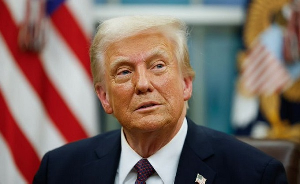SOME IMPORTANT OBSERVATIONS
We briefly mentioned the concept of self-made in Part 2 of the series. In fact, any person who claims exclusive right to being self-made is an Orwellian liar, a symbol of boastful exuberance. Rapper Tupac’s claim to that exclusive right of being “a self-made millionaire” in his hit song, “Hit ‘Em Up,” instantiates our point. In effect it is society that makes and unmakes individuals! This is a truism in human history and as well across societies whether communitarian or ruggedly individualistic. This is because of our natural status as social animals. It is also no secret that both the modern church and secular politics feed on the “blood” of human beings, mostly on gullible persons.
Not even the autocracy of the state or the statism Dr. Otabil conveniently lambasts now and then can escape the importance of the human person in matters of political actuation. He is a hugely successful man notwithstanding what his detractors and enemies would have us believe. Even more important, his dedicated congregation has been part of the story of that successful journey of his. Therefore, the church and the state are nothing without the masses. This is why Dr. Otabil cannot claim to be apolitical any time he goes political.
But his call for citizen democracy is in order. We, on the other hand, have called for grassroots democracy and grassroots activism as means through which we can effect meaningful radical political conscientization of the masses and positive change in the Ghanaian society. Perhaps, it is through grassroots democracy and radical conscientization of the masses that constitutional revolution, which Dr. Otabil should have called for, can overthrow statism. This is what the Constitutional Revolution of Iran did for the Iranians. We are however glad that Dr. Otabil realizes that fasting and prayers cannot overthrow statism.
GHANAIANS VERSUS THE STATE
The government is trying its best to build public services to make it easier for the private sector to function as it should. In this sense the state is not “hijacking” and “monopolizing” businesses in the private sector. What Dr. Otabil is saying as regards the state’s “monopolizing” and “hijacking” businesses is purely a partisan perception, and therefore lacks generic experiential affirmation.
The private sector needs to take advantage of these public services as the state cannot do everything for the masses as well as for the private sector. Neither can the government nor the private sector go it alone. Frankly, government, the state, and the private sector need each other!
Adam Smith, Karl Marx, Jean-Jacques Rousseau, Cheikh Anta Diop, Thomas Hobbes, Joseph Stiglitz, to name but a few, have all demonstrated the importance of the state or of political authority in the constitutional transaction of human affairs. In fact, this is the only experience man has known throughout history. The fact is that neoliberal economic ideas have never worked anywhere.
WHAT OUR DEDICATED READERSHIP SHOULD KNOW
Dr. Otabil’s statement to the effect that “We can’t just be happy because a road has been tarred. We can’t just be happy that we didn’t have electricity now we have electricity. We can’t be happy with minimals…citizens must have an appetite for better” is unfortunate, unfortunate because “minimals” is what even some of the most ardent aficionados of free-market capitalism demand of governments. Besides, he is “happy” because his congregation has made him and his family fabulously rich and therefore statism could not mean a lot for him, for his family, for he is a “statist” himself when it comes to management of his investments and spiritual matters, especially Christian eschatology.
On the other hand state interventionism is what has given rise to the so-called Asian Tigers (see “The East Asian Miracle: Where Did Adam Smith Go Wrong”). Ghana’s political class and technocrats can learn from the Asian Tigers.
Finally, we have spent some time on Ghanaweb and other news portals discussing what Adam Smith, one of the so-called “modern fathers of free-market capitalism,” expected of national governments in terms of their roles or contributions to free-market capitalism. An interesting aspect to his commentaries is that he devoted 3 chapters out of a total of 5 of his book, “The Wealth of Nations,” to discussing everything governments could and should do to make laissez-faire capitalism more effective (see the content of the subtle “Adam Smith on State Intervention or Regulation of the Market under the topic “What Ghanaians Can Learn from Pope Francis 2”).
In this regard, Dr. Otabil is saying the exact opposite of what Adam Smith said in his influential book. Of course, the former is neither a student of economic history, history of philosophy, economics, history of knowledge, nor cliometrics, and therefore his intellectual lapses, however small or big, in any of these areas are understandable and pardonable. This is not to say he is ignorant of deep intellectual questions as they relate to statecraft, political economy, political sociology, and development economics.
Nevertheless, we say this because we have religiously been following his intellectual development since the early days of the formation of his church, in addition to reading some of his major books and listening to many of his recorded pulpitry and sociopolitical commentaries, although we can say on authority that many of his political commentaries are platitudes of conventional political and spiritual pulpitry. What he may not possibly have known is that neoliberal economics has never worked anywhere. But “limited” state intervention is always required to make laissez-faire capitalism more efficient. This is a fact of the human experience.
Even most of those ardent aficionados of Smithian free-market capitalism conveniently avoid discussing the 3 chapters of “The Wealth of Nations” in public. The reason being that they cannot stand the hypocritical contradictions that come with the simultaneity of uncritically upholding and advocating the tenets of free-market capitalism and strictly adhering to the exegetical originalism of the book’s contents, the 3 chapters we previously referred to. That said, what Dr. Otabil may have also referred to as “minimals” constitutes the basis of Smith’s call for “limited” state (or government) interventionism in the marketplace, unless, of course, the former is deeply worried about the seeming outrageous prize tags attached to these “minimals” under the NDC.
In that case Dr. Otabil is somewhat justified if that, indeed, were the case. As a matter of fact, the more recent bus branding controversy is an example, a controversy that offers a teachable insight into his righteous indignation. We all should be deeply worried about government’s profligate spending (deficit spending), political corruption, indifference to the plight of the masses and national development, and gross policy misprioritization. Keeping government on its toes should be the way forward.
DR. OTABIL’S RIGHTEOUS HYPOCRISY
Thus, it does not make practical sense whatsoever when Dr. Otabil provocatively claimed to look forward to the day when government settles down to employing roughly five percent of medical doctors in Ghana. How many medical doctors did the state under President Kufuor employ? One percent? Two percent? Three percent? Four percent? Even so, is the government’s duty to establish private practices for medical doctors? Which government in human history has done this?
Everything aside, how is it possible for some medical professionals to have opened their own private practices in the country? Is the government preventing Dr. Otabil and his church members and the private sector from establishing private practices for medical doctors? And has the incumbent government ever threatened to interfere or is already interfering in the internal affairs of the Central University College (CUC), an institution of higher learning founded by Dr. Otabil’s ICGC? His inexcusable partisan politics is tarnishing the credibility of his public image because, among other things, not every member of his flock is NPP! Neither is the NPP better than the NDC. Both are merely different sides of the same political coin, for neither cares for the masses and Ghana.
It is ironic how Ghanaians want the state to do everything for them but still complain and nag when the state, which creates the enabling political climate for itself and for the private sector, takes advantage of the enabling environment to recoup its investments. And we would have wished if he could muster the courage to take the state to court and have the court reverse the constitutional encroachment of statism upon the Ghanaian political landscape. Dr. Otabil should have set a precedent for us during the Kufuor presidency. Let us wait and see what he will do in the case of a potential Führer Akufo-Addo’s government he does not succeed with the Mahama government.
Let Dr. Otabil never forget how managers of the private sector have colluded with the state in the spate of scandals arising from the illegal judgment-debt disbursements. Of course, there are also those Christians who believe tithes are theologically and doctrinally illegal! What does Dr. Otabil got to say about this?
WHERE WE AGREE WITH DR. MENSA OTABIL
Yet his critique of the political establishment does not take anything away from his grasp of political morality vis-à-vis the spate of political corruption, wanton wastage of public resources, and gross misprioritization of strategic and tactical policies, the same way Fela Kuti on the track “Coffin for Head of State” castigates pastoral indulgence in material flamboyance and profligacy, political corruption, and politicians sponsoring people for Hajj when the country basic public services.
In this regard, we need more of the Dr. Otabils in the political or presidential seat rather than being on the fence screaming his lungs out, where, if we may also add, his political lungs will be swallowed in the tone-deaf cacophony of incumbent intransigence. We would rather he stayed out of partisan politics completely so as to preserve his respect, honor, pastoral and intellectual sovereignty, and integrity, for he is an individual who is respected the world over. As a matter of fact, he is one of the few intelligent leaders we have in Africa today. And no one can take this fact from him on the condition that he does not allow partisan politics to destroy his rich legacy.
Yet we also think if his private concerns and particularly those of his church and university are failing to compete successfully with state enterprises and bureaucracies, the best option for him at this moment and those who managers of his private concerns to consider or look into is getting to the bottom of why this is so, rather than throwing his political tantrums and misplaced insinuations about. Benchmarking, knowledge management, gap and risk analysis, critical success factor, strategic imperatives, and core competency are a few areas he and his advisors can look into. After all, only a handle of national economies are doing so relatively well today.
CONCLUSION
We may therefore suggest to him to begin writing those of his speeches he allows Samuel Atta-Akyea, Führer Akufo-Addo’s cousin, writes for him. It is believed that one of the speeches in which Dr. Otabil “called members of the ruling party evil persons and also diagnosed them as suffering from schizophrenia—severe mental sickness—was written for him by the New Patriotic Party (NPP) Member of Parliament (MP) for Abuakwa South, Samuel Atta Akyea, who doubles as his lawyer.”
The phrase “evil persons” looks more like what David Frum, John Bolton, Yossef Bodansky, Condoleezza Rice, and a number of persons on the political right in America called “the axis of evil.”
Fortunately, both of the two phrases “the axis of evil” and “evil persons…suffering from schizophrenia” fit the screwed-up political psychology of our non-patriotic, callous, and clueless politicians.
Reference
Ghanaweb. “Atta Akyea wrote Otabil’s evil speech.” Sourced from the Herald Newspaper. November 14, 2012.
David Frum. (2003). “The Right Man: The Surprise Presidency of George W. Bush.” New York, NY: Random House.
We shall return with the concluding installment (PART 4)…
Opinions of Sunday, 21 February 2016
Columnist: Kwarteng, Francis
How do we wrest Ghana from incompetence, Dr. Mensa Otabil? - Part III
Entertainment













